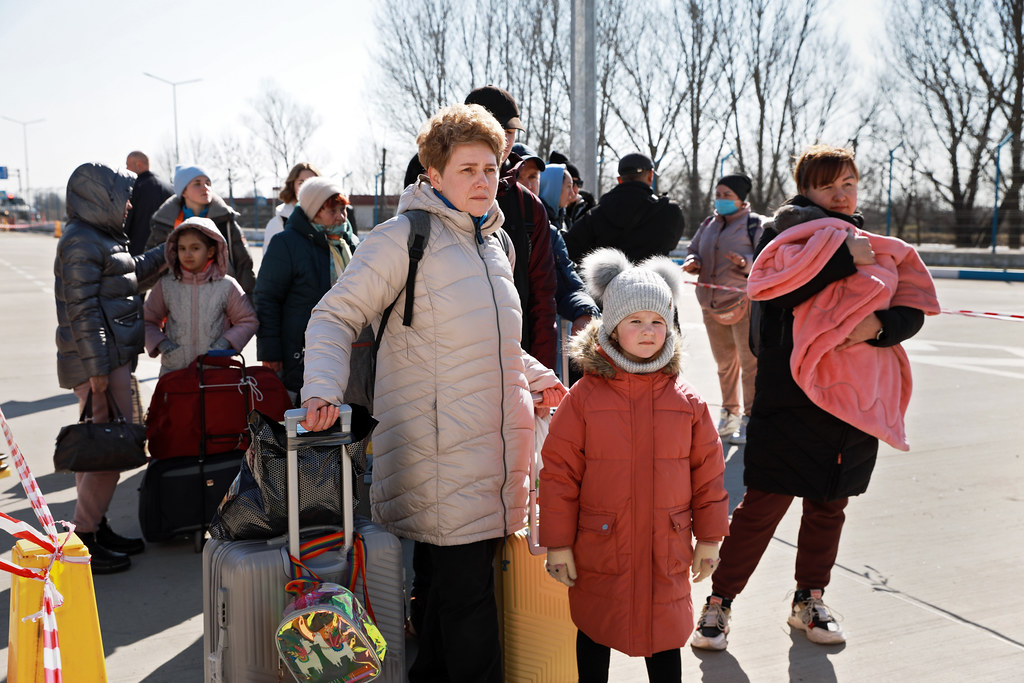Due to the war in Ukraine, Poland has received one and a half million Ukrainian refugees in 2022. For the first time in its modern history, Poland became a primarily migrant-receiving country. In light of International Migrants Day, we virtually sat down with our alumni Paulina and Magdalena who work for two Polish NGOs. How did they experience the challenges in hosting the Ukrainian refugees and what did they take from the course on Migration & Local Governance?

Ukrainians fleeing the war. Photo by: Aurel Obreja (UN Women), 2022.
Paulina Maciak is a project coordinator at WroMigrant and Magdalena Nazimek-Rakoczy is president & and head of the legal department at the Nomada Association for Multicultural Society Integration. They describe how Polish municipalities, after the Russian aggression on Ukraine and the arrival of Ukrainian refugees, were forced to quickly find solutions to be able to receive hundreds of thousands of newcomers. Lacking experience as a migration country and not having guidelines of national migration policy, local governments, NGOs and volunteers were confronted with the challenges of providing education, social services, and housing for refugees.
As Poland transforms from a transit and emigration country – one where migrants travel through or leave for other destinations – to a migrant-receiving one, civil society and local government practitioners in Poland are expected to adjust to a new reality of migration governance. As Magdalena explains, “the novelty of this vital change calls for a new approach, developing strategies and local migration policies”.
Their work supporting refugees
Both Paulina and Magdalena have engaged in projects that deal directly with Poland’s new role in migration governance. Based in Wrocław, they work for organisations that fill in the gaps of existing migrant and refugee support structures. Paulina works at the Information Point for Migrants and Refugees at Wrocław’s Center for Social Development. She developed training programmes and partnerships with local institutions and NGOs and set up a new support centre for refugees from Ukraine.
In the meantime, the Nomada Association as helmed by Magdalena seeks to offer support or legal counsel to Ukrainian refugees adjusting to Polish life and bureaucracy as well as to those who experience forms of violence motivated by discrimination. Magdalena also recently launched a community centre, “Open Place – Centre for Multicultural Integration” in cooperation with UNHCR and the Danish Refugee Council.
Lessons learnt from The Hague Academy
Since Polish migration governance is at a crossroads, needing to adapt quickly to new challenges, Paulina and Magdalena attended the course at The Hague Academy to receive inspiration for a new migration policy at home and “to get acquainted with the experiences of other migration countries as well as with the know-how of migration field experts”.
Highlights were the study visits in Rotterdam to the ‘The Storyhouse Belvedere’ and ‘ROS Organisation to Support Undocumented Migrants’, both showcasing how to create safe spaces for migrants and refugees in an unconventional way. The Storyhouse Belvedere uses art, culture and stories as community-building tools to connect host communities and migrants. ROS, on the other hand, supports undocumented migrants by providing realistic information about their (legal) possibilities, while always striving for self-reliance and autonomy.
The case study of Jan Braat in Utrecht and the way he leveraged a crisis to introduce an innovative refugee housing project, was also inspiring. Paulina: “In the future, I will try to apply the concept of multi-level governance and mainstreaming social cohesion into all local migration projects”.
Looking to the future
As it stands now, migration in Poland is heavily politicised. Structures for migration management are relatively underdeveloped as policies have focused on its prevention altogether. But things are changing, and both Pauline and Magdalena wish to encourage a shift in the narrative to considerate management, and social cohesion and assistance.
“I would like to live in a more diverse country where the host community has a better understanding of the global and natural migration processes”, explains Pauline, while Magdalena expresses her wish for a more inclusive and less discriminatory public debate. She hopes to see a system that treats “migrants as subjects having the same set of needs and rights as every person”.
Both will continue to work tirelessly toward the transformation of migration governance in their community.
Join the Migration and Local Governance course!
Are you interested to learn how local authorities can develop innovative solutions to the complex challenges of displaced populations, and how they can include the needs of migrants and refugees in local development planning? Make sure to join our Migration and Local Governance course!
Related courses
We offer a diversity of courses throughout the year. Here are several other courses you might like.

